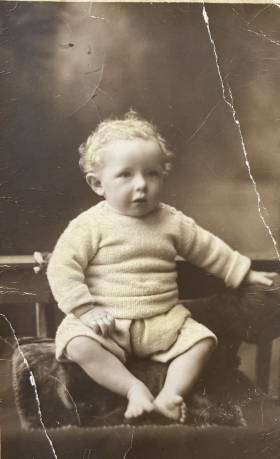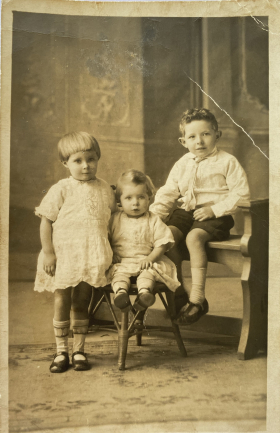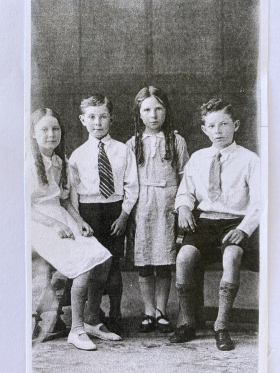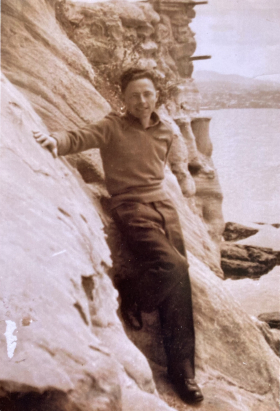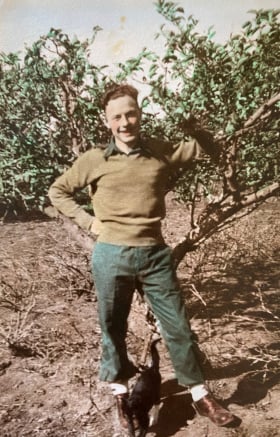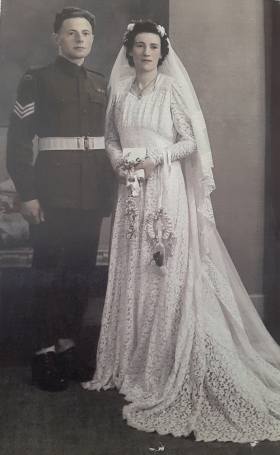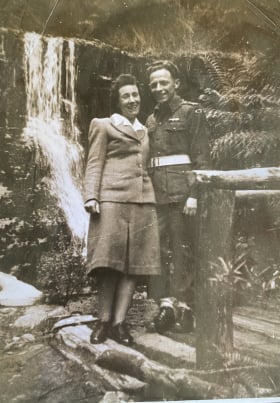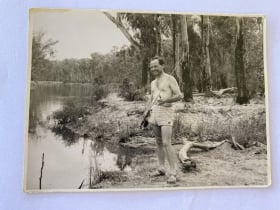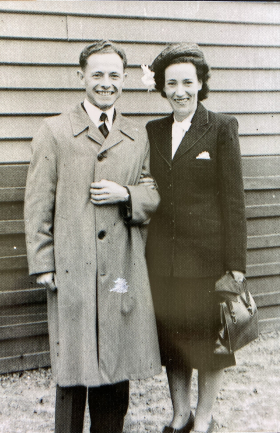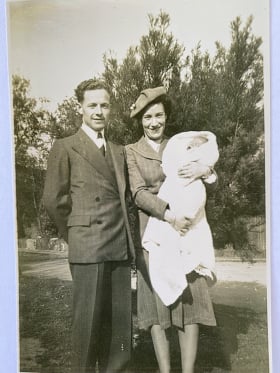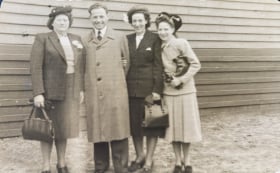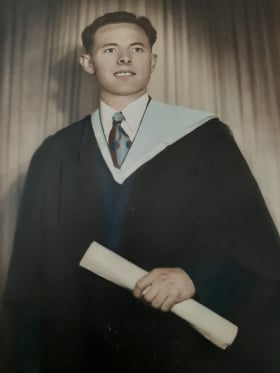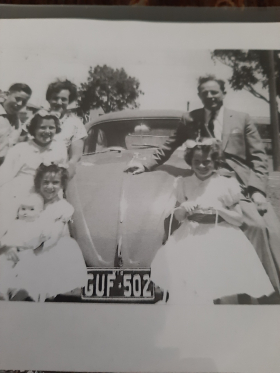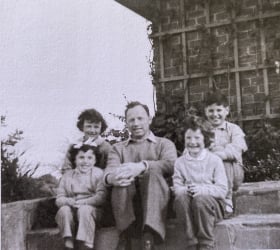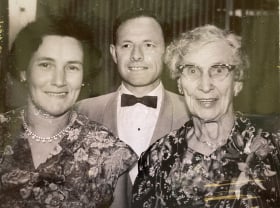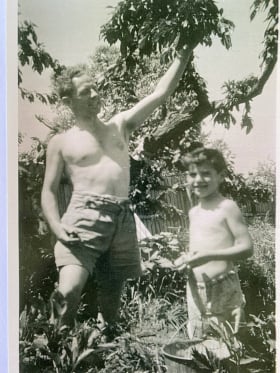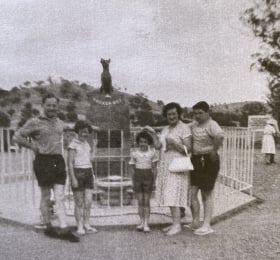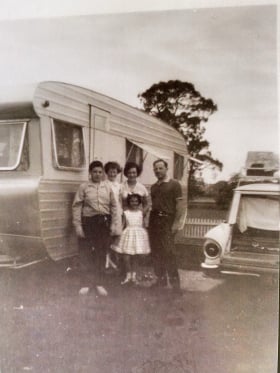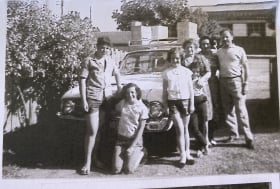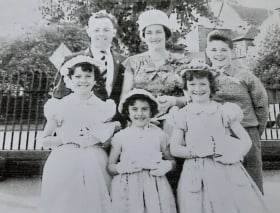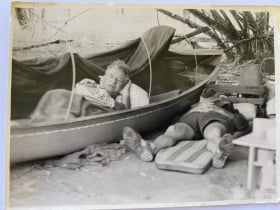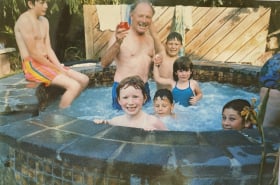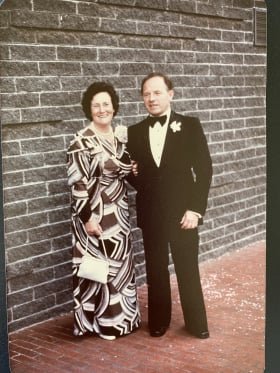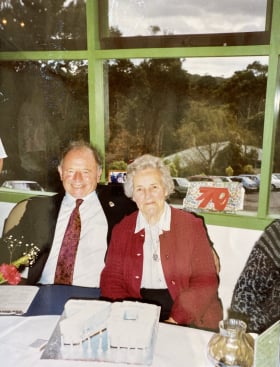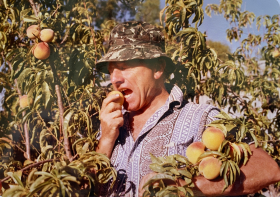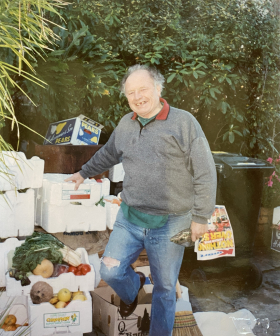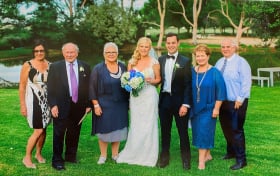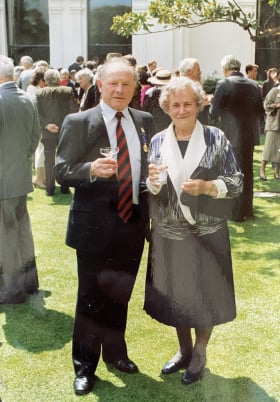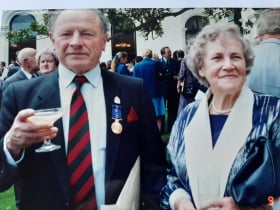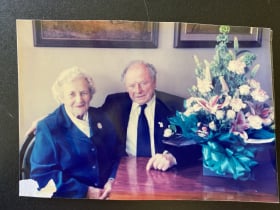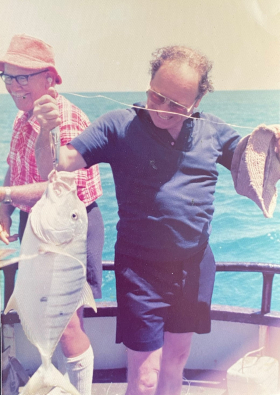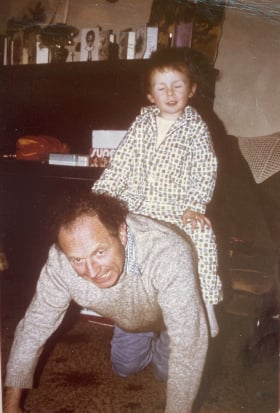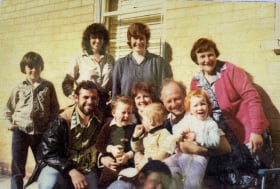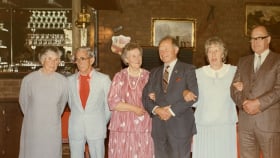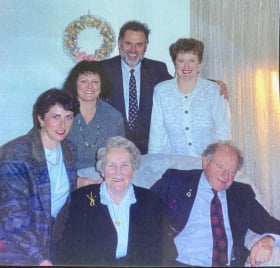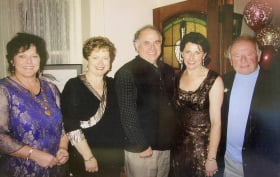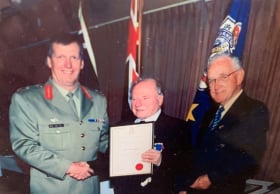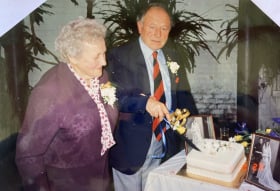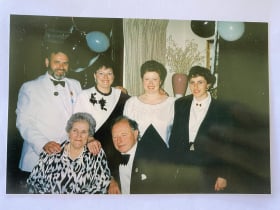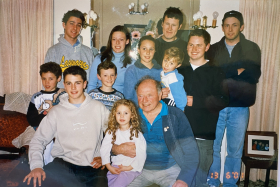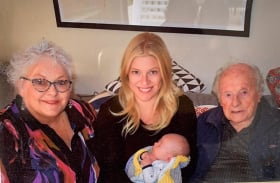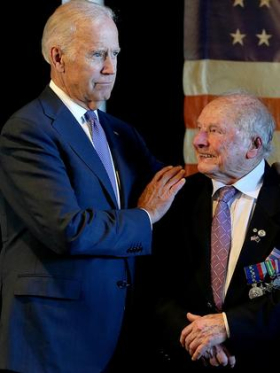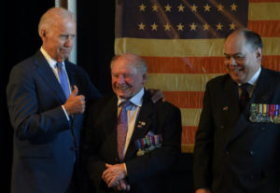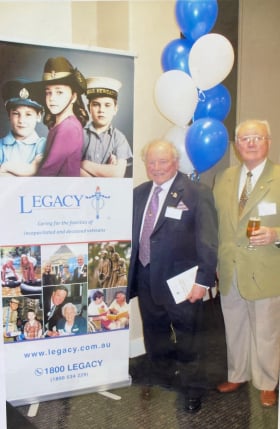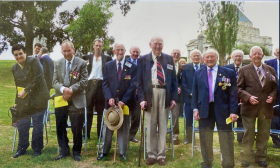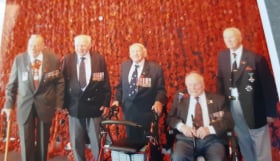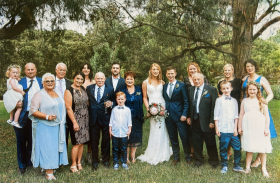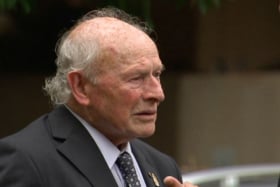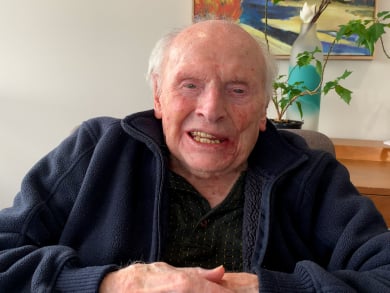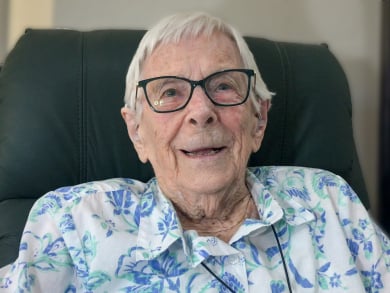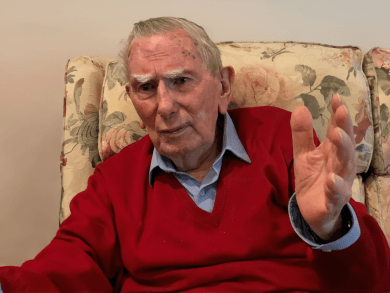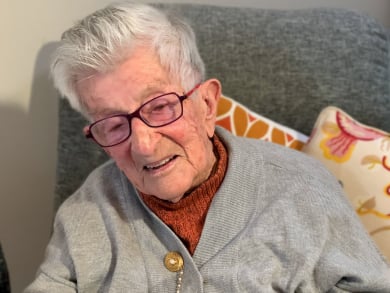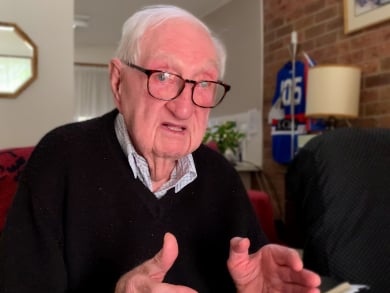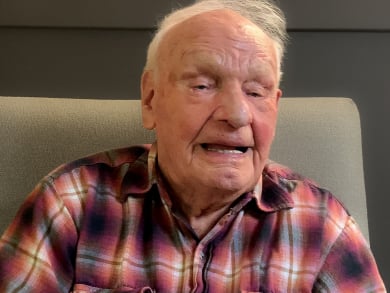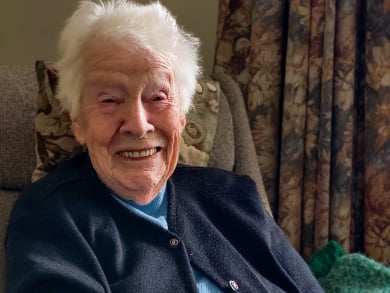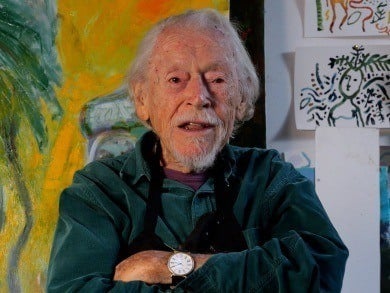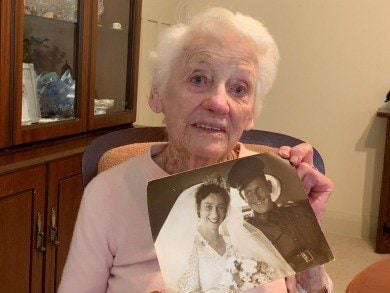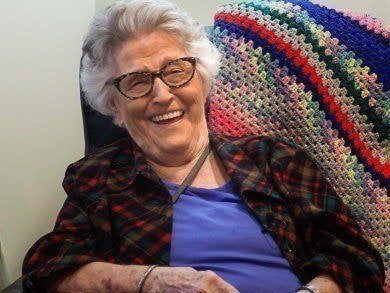Closed captioned icon
View audio transcription
...and he’d say to me, “You didn't shave this morning, gunner.” I said, “Yes, sir!” “Did you shave this morning, gunner?” I said, “Yes sir.” Then [he’d] say, “Stand closer to the razor next time.” Always the same answer.
I'm Frederick Albert Cullen. Born at Wangaratta on the 13th June 1921.
see, when I say the change was very limited and tough in many ways, my father was worked on the railways.
He was a works ganger,
working from Shepparton was the base.
Might take him up to Cobram or to Strathmerton or to
Echuca even.
They'd leave on the Monday and get back on a Friday afternoon late and
the fellows would obviously go the pub and then get home.
My father was very tough and hard on me. He thought I should be out working rather than going to school, for example. I used to have to hide up on the top of a hedge, a big privet hedge around our house at Shepparton. I used to climb up there and have a sleeping bag. I'd have to sleep up there because he’d pull me out of bed and get me to chop wood
and do all sorts of things. If I hadn't had enough wood chopped he’d hop into me with a
switch from a Judas Tree. Beautiful tree. It had a blossom,
pea-like shape to blossom completely covered on the branch. This Judas Tree... I haven't seen one around anywhere else.
Anyhow, the
switch was very flexible and it hurt when it got on your backside, I can tell you.
Mum grew up, she was.
one of 14 children
from a farm, at Lacebie.
Dairy farm mainly,
because I can remember, as a kid, turning the separator to get the milk into cream.
She could make a meal out of anything.
She knew how to cook meat and all that sort of thing.
I used to have to go down to the Freezing Works at Shepparton to buy a leg of lamb.
Get it for half the price of a butcher.
It might have been a bit tough though. That didn't seem to worry my mother much.
I was the eldest.
The others had an easier run than I did, I think.
Started at the Shepparton State School.
When they found that I [had] Catholic parents, I should've been to Catholic school.
As a primary school I rose up at St Brendan’s. S I became dux of the school
and I won a scholarship to
the secondary college there,
Sacred Heart
College, Shepparton.
It was a matter of economics.
I was getting three pound, six and nine a fortnight, I think, in the Education Service
but in the Army, I was getting... Oh, I’ve forgotten what the pay was... 35 bob a day or something, but it was all mine. No tax, no nothing. I had money to spend for a change, but I didn't spend it.
I saved it mainly.
Started my investment career.
I joined the 4th Australian Field Regiment.
An artillery regiment. 25 pounder guns.
I rose up in that to be
Gun Position Officer
in the 10th battery of that regiment.
Oh, we did very extensive training.
Camp site 17,
Seymour.
Then we went to Bonegilla.
To Toowoomba
I could have married a girl from there if I’d stayed in Australia.
She’s probably still waiting for me.
By troop train up to
Townsville
and we took off from a ship called the
Katoomba.
It was the ship we went to New Guinea on.
We landed at Lea
and then we went inland.
following the Japs along the track.
Anyhow, I
engaged
with the regiment
selecting a better gun position.
Field guns’ projectory went ten miles, 15 miles.
Straight out that way.
So you have to have a bit of survey knowledge and
knowledge of weather conditions affecting
trajectory of the shell:
wind direction,
velocity,
temperature,
up or down.
You had to be sure
the shells you were firing had
a definite chance of success of
rerouting the enemy or knocking a few of them off.
8 o’clock in the morning, I was walking around outside, looking around with my compass and looking at trees, looking at ... looking for a new gun position.
Brigadier Cremor thought we could get better range
somewhere else. We were too enclosed where we were.
And I was charged with the selection of a new gun position.
I was fiddling around in the countryside more or less,
looking around, and there was a tree nearby and
I thought we should check that tree out, might be a sniper up there and in a fraction of time, ‘bang’ and I was hit on the head. The bullet went through my head here. There's a little hole there still. I can feel
the hole.
Went through there, through my head, through my hat. I had the hat on. It went through my hat. It might have helped to deflect the bullet somewhat.
It blew half my head out at the back.
Luckily I was picked up by an ambulance bloke right from the
14th Field Ambulance.
Had Lance not come along in his ambulance truck and picked me up I would have been gone in a couple of hours. I would have bled to death.
I was carried by natives about ten miles through bush to this airfield at a place called Goosap. They had an ambulance plane there ready to take me to Lea, where there was a good hospital at Lea. Army hospital. They looked after me there for a couple of the nights,
and whizzed me over the hills to Port Moresby.
The army hospital there which [was] a bit more refined I suppose then the one I was at. I can’t remember a thing about this. I can’t remember a thing. I was out to it like a light.
Then I was taken to the hospital ship
which was about to depart for Australia.
Other ships flying by and aircraft flying overhead.
And that's when I came to. I got my thinking powers back.
...in Sydney, I was taken to Concord Hospital
and then I was on my way to
the military hospital at Heidelberg.
Benjamin Rank, top line plastic surgeon, was operating.
Was in hospital for quite a while.
Lucky to recover.
Jock Gorton was there.
He was being patched up by
Rank.
He had severe facial burns.
Aircraft accident or something.
As I got better, Jock said let's go and visit Dr... Dr Foster. Dr Foster was Fosters Lager.
We went down to Dr Foster and hitched lifts down.
Anyhow, we enjoyed a few beers down there.
He drank twice as much as I did.
The stay at Heidelberg was quite interesting because the girls from
Ivanhoe
visit the hospital every Sunday to visit lonely soldiers.
Bring us lollies and toothbrushes and all the rest of it.
One of them
that's just taken an interest in me
and brought me home for dinner one Sunday evening.
About a year after we met, we were married. Her name
was Carmel Quinn. We had four lovely children.
I was Welfare Officer of the Regiment.
I looked after widows of people in the Regiment who had died, or died because of war service particularly.
I had that job for over 50 years.
And in fact there’s one widow here still on my list. Still haven't won her case yet but I’m still persisting.
Member of the Dunlop Foundation because of my work for widows and so on. I was made a Life Governor of The Foundation.
In fact I got my OAM largely because of my work there. Order of Australia medal.
He might have been lauded or something when he got back to Japan. I'd like to meet him actually.
I don't feel, I don't have any harsh feelings about them. Bloody good soldiers.
Tough and tenacious.
It's all I know.
I go to sleep every night and I say my prayers, by the way. My prayers I still engage in and I’m quite comfortable with going to sleep and waking up in the morning.
I expect to wake up. If not, I’ll have a word to say to my Maker.
What?
Thanks To
Maria Geary
Fred Cullen
"I thought we should check that tree out, might be a sniper up there"
Inspiring Stories: A Veteran's Journey of Courage and Kindness
Born in Wangaratta and raised in Shepparton, Fred’s decision to join the Army during World War II would shape his life in unimaginable ways. Fighting alongside a 25 pounder gun in New Guinea, he faced the horrors of war head-on, surviving a near-fatal encounter with a Japanese sniper.
After the war, he dedicated himself to helping war widows and contributing to the Weary Dunlop Foundation, ensuring that those who had sacrificed so much received the support they deserved. His remarkable acts of kindness and commitment to his community were recognized when he was awarded the Order of Australia Medal (OAM) as part of the Governor-General’s Kindness in the Community Awards.
Age in Video
102 yearsDate of Birth
13th June 1921Place of Birth
Wangaratta, AustraliaThanks To
Maria Geary
